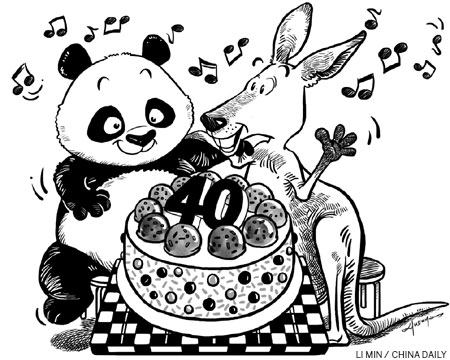
China is Australia's No 1 trade partner, export destination, import source and, increasingly, investment source. It's no wonder a long line of Australian state and federal ministers will visit Beijing to celebrate the 40th anniversary of diplomatic ties between Australia and China.
Foreign visitors are mainly concerned with the fast pace of economic growth in China and its impact on the rest of the world. Now the fear is not of how fast China is growing, but how fast it is slowing. Because, with the euro crisis and the on-again off- again recovery in the United States and Japan, if there's anything the world fears more than a fast China, it is a slow China. This fear of a Chinese slowdown has come to the fore especially after the People's Bank of China introduced another round of interest rate cuts and recent data have not been as strong as expected.
It is debatable whether interest rate cuts would work anyway, given the amount of stimulus that is still in the Chinese economy as Beijing moves economic activity to the second and third-tier cities in the interior. It is not like the United States where rates are so low that expansionary monetary policy is now like "pushing on a string".
But should we be worried about the slowdown in China? After all, there have been immense wage and price inflationary risks building up and a red-hot housing market in parts of China, so a bit of cooling might be welcome.
What effect will China's slowdown have on Australia's exports to China?
First, Australia has little to worry about, mainly because it is shipping coal, iron ore and natural gas to fuel the massive urbanization process that is under way to build up second-tier cities in China, such as Chengdu, Wuhan, Chongqing and Changsha. In fact, the China story is as much about urbanization as it is about globalization.
Second, agricultural exports are still very important. There are millions of mouths to feed in China and Australia is not only exporting agricultural goods but also agricultural expertise, research and development and technology to help increase China's agricultural production.
Third, Australian companies in the service sector are doing very well in China. On my recent visit to Guangzhou, which now accounts for 10 percent of China's trade with Australia, Jeff Turner, Australia's senior trade commissioner, talked to me about a "plethora of new Australian companies in the region". These are predominantly media, education, and tourism companies.
Fourth, with a more outward approach to the world economy, China's investment story is now taking shape. For major Chinese companies such as Huawei, 70 percent of their sales are overseas and their global supply chains provide opportunities for Australian small and medium-sized enterprises. These investment links will be getting stronger as Australia is looking to become the third country allowed to directly convert its currency to the yuan. "The internationalization of the yuan is clearly in the interests of Australian businesses and the broader Australian economy, which is why we've been taking action to promote and deepen the market in yuan and Australian dollar transactions," said Australia's Federal Treasurer Wayne Swan, who is due to attend a forum on yuan internationalization in Hong Kong next week.
So, even in a slower world economy, opportunities abound for Australia in China. Forty years ago, thanks to Gough Whitlam, the prime minister at that time, Australia gained an early advantage in terms of economic ties with China. I am sure that the current Prime Minister Julia Gillard will be giving silent thanks for this.
The author is the J.W. Nevile Fellow in economics at the Australian School of Business, UNSW in Sydney and author of The Airport Economist.
(China Daily 07/13/2012 page9)